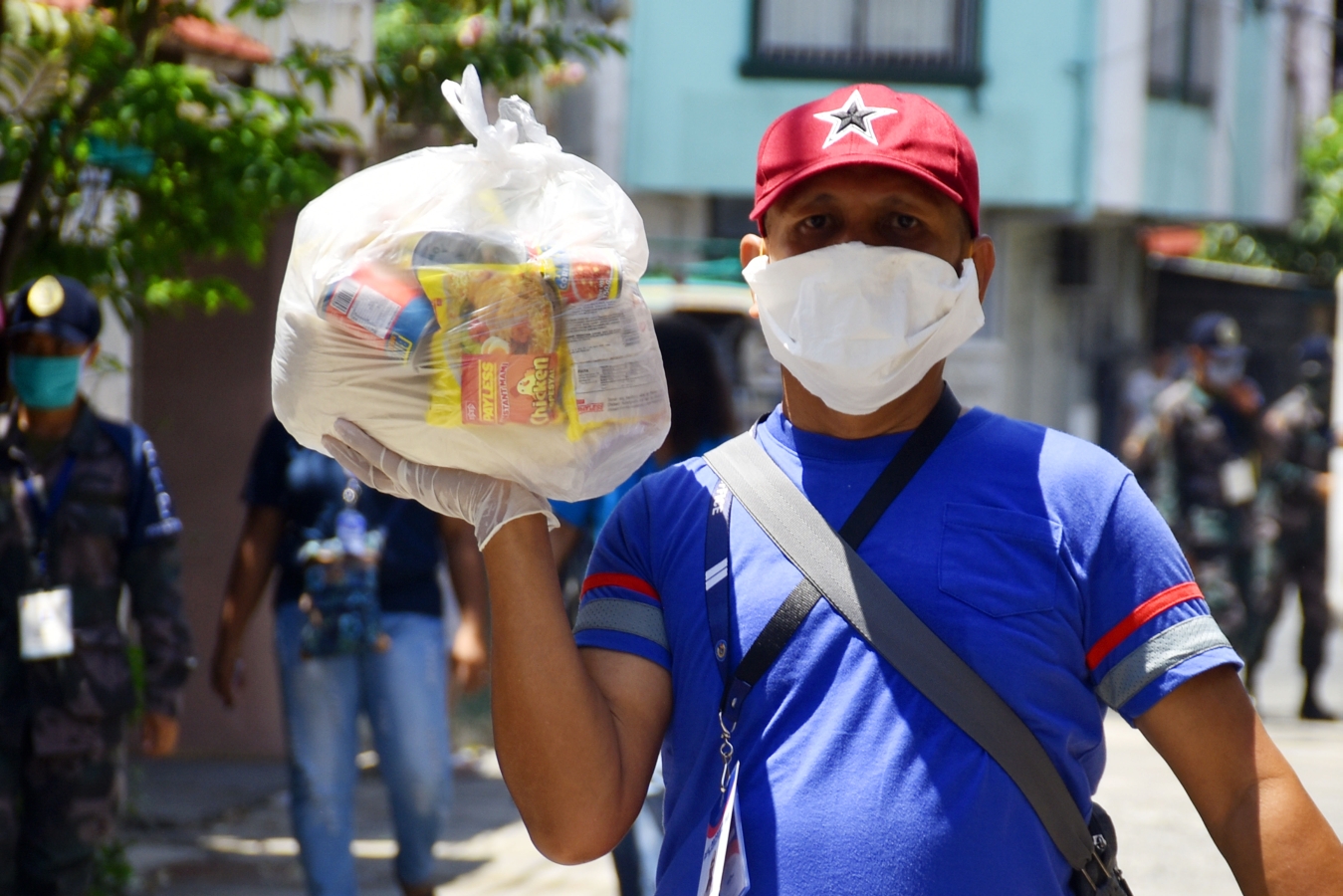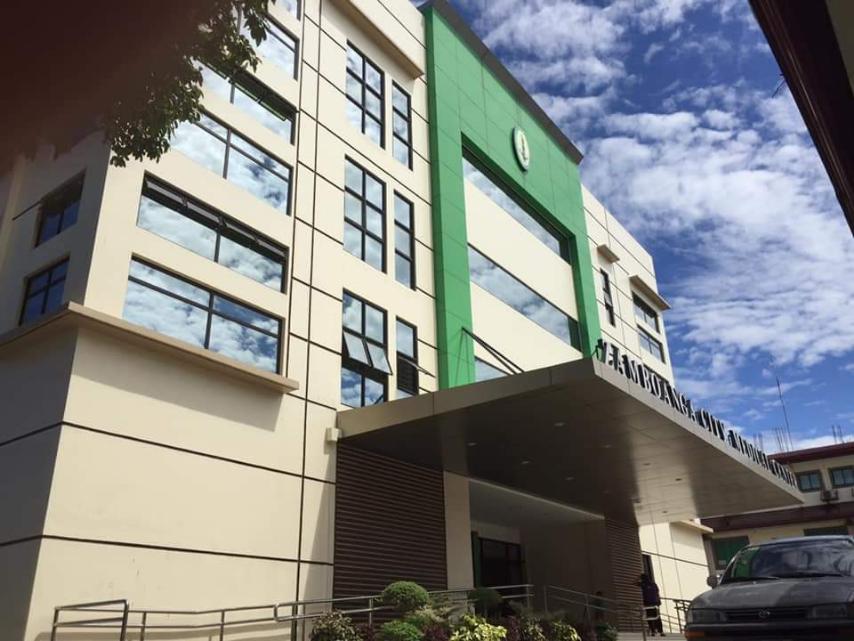Hospitals readied to accept virus patients

RELIEVED This Dagupan City resident brings home relief goods, which were distributed by City Hall employees on Wednesday. Local governments have been trying to assuage residents’ fears about losing food supplies as they ride out the Luzon quarantine. —WILLIE LOMIBAO
Local governments and health authorities outside of Metro Manila are scrambling to cope with the challenges posed by the rising number of persons found to be positive or have died of the new coronavirus disease, or COVID-19, and of those categorized as persons under investigation (PUIs) and persons under monitoring (PUMs).
Amid reports of dwindling food supply or breakdown in food delivery chain resulting from uncoordinated lockdowns among towns and cities, they also have to face complaints from hospital officials who decried discrimination against health workers in the front line of the fight against the virus or of residents rising in panic over the presence of COVID-19 patients in the hospitals in their communities.
Reports coming from the provinces showed that the number of PUIs (persons who show symptoms of COVID-19) in the regions outside Metro Manila has reached over 6,000 while the PUMs (persons being monitored for coming from Metro Manila and other virus-positive places) was close to half a million.
The number of persons in the country found positive of SARS-CoV-2, the virus that causes COVID-19, has reached 803 as of noon on Friday, according to the Department of Health. Half of this number involved patients outside of Metro Manila, with Calabarzon (Cavite, Laguna, Batangas, Rizal and Quezon) accounting for 95 of the cases, with 14 deaths.
The latest fatality in Northern Luzon was former provincial Board Member Raul Sison of Pangasinan who died on Thursday, the same day his test results were released to confirm that he was the province’s third fatality due to the coronavirus.
Pangasinan Provincial Health Officer Anna de Guzman confirmed Sison’s death due to the virus but said they had no information about how he acquired the disease.
Facilities prepped
Sison’s son, Urbiztondo Mayor Martin Sison II, said the last time his father visited the town was in January. He said his father’s death certificate indicated that he died of acute respiratory distress syndrome secondary to pneumonia. De Guzman said Sison’s remains had been cremated.
While health authorities in Mindanao were emptying key government hospitals of existing patients as they prepped up these facilities solely for patients found positive of COVID-19, in Luzon, the decision to turn a mental health facility in Mariveles town of Bataan province into a quarantine site stirred panic among the residents.
Residents of Mariveles, which hosts the Freeport Area of Bataan, were caught by surprise on Thursday when an ambulance ferried five patients from New Clark City to be quarantined at a hospital in the heart of the municipality.
Threatened lockdown
Municipal Administrator Angel Peliglorio said the patients taken in by the Mariveles Center for Mental Health were PUIs and “are not infected” but it did not appease the townsfolk.
Francisco delos Reyes Jr., village chair of Barangay Poblacion, said health village officials or the municipal government should have been informed “ahead of time to avoid panic and confusion among residents.”
Delos Reyes threatened to immediately place the village on lockdown to mitigate the risk of COVID-19 transmission.
The Luzon-wide lockdown designed to contain the virus has displaced 32,000 factory workers when 97 manufacturers and other businesses operating at the Bataan free port suspended their operations.
In Zamboanga City, over 200 regular patients of the Zamboanga City Medical Center (ZCMC) are set for transfer to two other hospitals in the city to give way for it becoming a COVID-19 referral facility.

READY New outpatient building of Zamboanga City Medical Center being readied to accept COVID-19 patients. —PHOTO FROM ZAMBOANGA CITY MEDICAL CENTER FACEBOOK
Isolation center
Dr. Joshua Brillantes, Department of Health assistant regional director in western Mindanao, said that the ZCMC “is now the official isolation facility for COVID-19 related cases” and would admit PUIs who displayed moderate to severe symptoms of infection, as well as those tested positive for COVID-19. The hospital currently has 286 regular ward patients, 28 of whom are in the intensive care units, who would need to be transferred.
The ZCMC’s out-patient department (OPD) is now being converted as the center for COVID-19 related consultations and admission. The city’s lone COVID-19 case, so far, is already admitted there.
In Davao City, the Southern Philippines Medical Center (SPMC) has already closed its OPD operations to free up its health personnel of load and be deployed to cater to suspected COVID-19 patients.
Mayor Sara Duterte has asked those who seek medical attention, especially for minor concerns, to go to other hospitals who were capable of attending to them.
This is to ease the patient load of the SPMC and have it only focused on critical illnesses and COVID-19.
Six nonhospital PUI centers have also been set up in Davao City, all capable of accommodating at least 800 people. One of these centers is the unused drug rehab center in Malagos with a 350-bed capacity, which already admitted 28 PUIs.
The La Vida Inn had also offered 37 rooms, the ALS Building, 59 rooms, the Queensland Hotel, 240 rooms, and the Boy Scouts of the Philippines facility in Malagos.
Appliances distributor Emcor is presently converting container vans into PUI centers, while a public school is being eyed as an additional facility for the same purpose, with consent from the education department.
Verbal abuse
In Bacolod City, Negros Occidental Provincial Administrator Rayfrando Diaz appealed to the public to stop discriminating against hospital workers who sacrificed their safety to fight the disease. “Please let us not fight them. Instead, we need to show our all-out support for these people. We need to support each other in this time of crisis,” he said.
In a letter, Chuck Estrella of the Riverside Medical Center Inc. (RMCI) asked Negros Occidental Gov. Eugenio Jose Lacson to help stop the discrimination of hospital personnel who were treated differently after news broke out about the first person who tested positive of the virus in Bacolod City.
Estrella said some health workers were denied rides on trisikads or jeepneys, denied entry at small office shops and with one even verbally harassed by a policeman simply because they were working at the RMCI.
Worst, he said, some employees were asked to vacate the places they were renting because the landlord and their neighbors feared possible contamination.
“Despite the effort that we put forth and the sacrifices we make in not being with our families and risking our health, we are confronted with another battle as soon as our shift at the hospital ends. We now have to face discrimination coming from our own,” Estrella said.
In Iloilo, health workers of an Iloilo hospital also complained of discrimination.
Nurses, resident doctors, medical technicians and even security guards of The Medical City Iloilo have been told to leave by landlords of their boarding houses and refused service in eateries over concerns of contamination.
Some were barred from buses and turned back in border checkpoints. —REPORTS FROM YOLANDA SOTELO, VILLAMOR VISAYA JR. , CARMELA REYES-ESTROPE , GREG REFRACCION, JOANNA ROSE AGLIBOT, JULIE ALIPALA, KARLOS MANLUPIG, CARLA P. GOMEZ AND NESTOR P. BURGOS
For more news about the novel coronavirus click here.
What you need to know about Coronavirus.
For more information on COVID-19, call the DOH Hotline: (02) 86517800 local 1149/1150.
The Inquirer Foundation supports our healthcare frontliners and is still accepting cash donations to be deposited at Banco de Oro (BDO) current account #007960018860 or donate through PayMaya using this link.